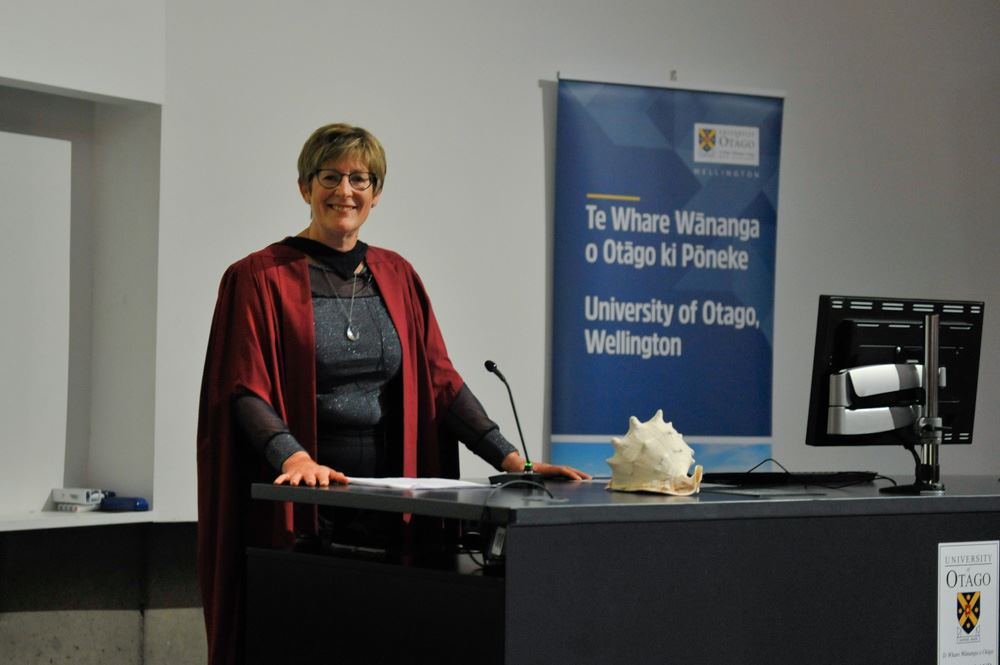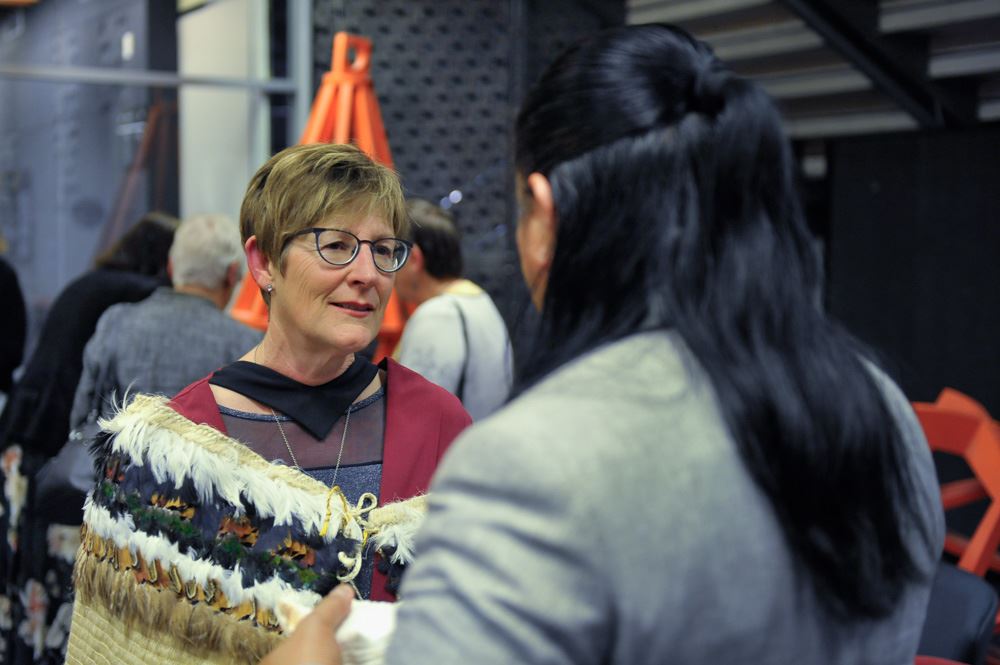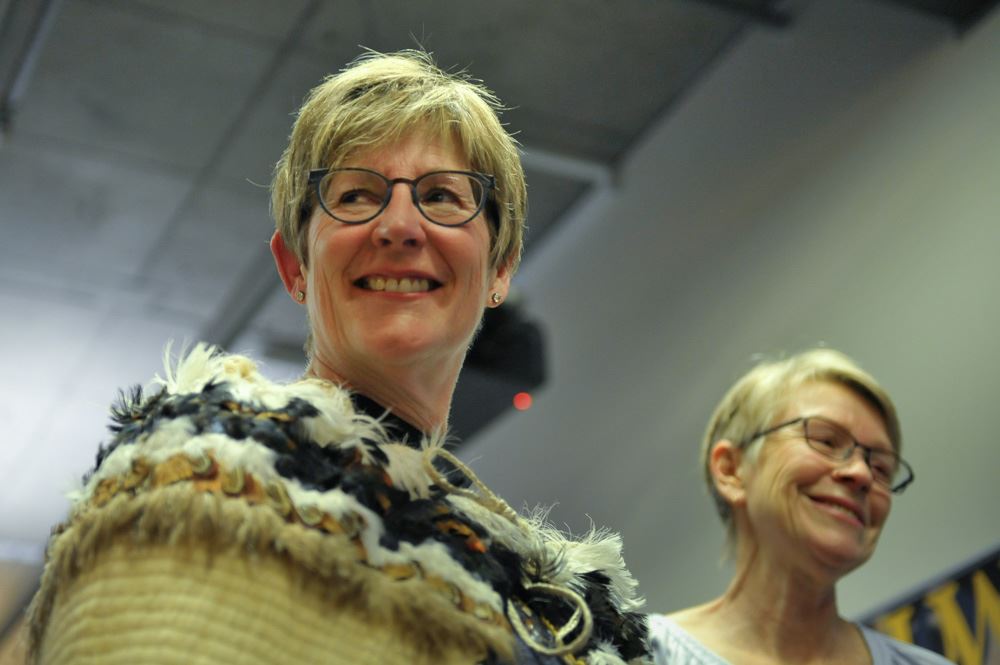Author: Shar Davis
Commencing her Inaugural Professorial Lecture with a quote from Katherine Mansfield, Jean Hay-Smith set the tone for not only her lecture but her academic career— “I want to be all that I am capable of becoming”.

Speaking to the gathered audience and those streaming the lecture online, Jean began by tracing the educational legacy of the previous four generations of women on her maternal side. From her great-great-grandmother who was illiterate through to her mother, a teacher, who had a huge influence on her education and “perhaps unwittingly she was the influence on my clinical career in women’s health”, said Jean.
Jean’s foray into women’s health began when she was 15 years old, after her mother got her a job as a nurse aid at the Helensville Obstetrics Hospital, where she continued to work part-time for six years until she completed her physiotherapy studies.
“The health and wellbeing of women was as much in my blood as education,” Jean reflected. Her career took her to London for 10 years where she met Professor Wendy Savage, who began referring patients experiencing painful sex after childbirth to her. “I didn’t have a clue what to do, and I suspect she didn’t either,” said Jean.
She also met Jill Mantle who Jean credits as the person who encouraged her to consider doing a higher degree and set her on the academic path. Perhaps Jill saw all that Jean was capable of becoming.
As she commenced her master’s looking at the issue of painful sex post-childbirth, Jean began to realise that lots of treatments were being used in women’s health, without much evidence to support them.
“Randomised control trials were considered the gold standard way of testing the effectiveness of healthcare interventions—finding randomised trials, critiquing randomised trials and synthesising the data—this is the methodology that became the foundation of my research career,” said Jean.
A large portion of Jean’s research and work that followed focused on pelvic floor muscle exercises as a treatment to assist in the issue of continence for women, particularly after childbirth. As part of her PhD, she undertook a randomised trial with more than 300 women screened and more than 120 taking part.
“By the end of the trial I’d heard so many stories of [women] living with a bladder problem and trying to do these exercises called pelvic floor muscle exercises that I felt compelled to put a qualitative study in my PhD”.
“What I learned from the 20 women I interviewed was how long and how hard they had worked to keep their incontinence private, how silenced they were by a whole set of circumstances.”

No one will forget the picture Jean painted when she shared one woman’s experience after her doctor suggested she could try ‘those exercises’ to help with her incontinence. “This woman had done toe raises while washing the dishes for more than 20 years,” Jean explained.
Jean is not afraid to call out the weaknesses in research or in the health care system, suggesting New Zealand’s current maternity health care is substandard, causing women to miss out on effective interventions. Midwives are being overloaded with so many different aspects of a woman’s health journey as their workload has increased but the system hasn’t adapted with those changes.
Perhaps the most powerful moment of the lecture came as Jean described how an alternative reading of women’s responses regarding seeking medical assistance, showed women as “resourceful and resilient, rather than recalcitrant—because a lot of these research paper introductions are saying ‘You naughty people, you should be seeking help for this problem and you’re not.’,” Jean explained.
“So, I want to think more broadly about the wellbeing of women, taking an anthropological, more sociological view, the misogyny of science and medicine—it’s pretty clear to see,” said Jean.
“Women have been excluded from research. Women’s anatomy, physiology and behaviour has been considered deviant and, at other times. women have been experimented on.
“What must stop is the widespread adoption of new treatments in practice which outrun the evidence of their effects for women, and for safety for women.”

Jean has moved away from middle-aged women, pelvic floor muscle exercises, systematic reviews and randomised trials and moved towards research for people with bladder and bowel problems after stroke. Working alongside Dr Rachelle Martin, Jean has completed a small study investigating “what might support stroke survivors with bladder and bowel problems to take part in their social roles inside and outside their home.”
Jean finished her lecture with a series of thanks, firstly to those who she collaborated on research projects with, “it’s their work as much as mine that has created the portfolio that means I stand here today.” She thanked her colleagues at the Rehabilitation Teaching and Research unit past and present, and her family who have supported her throughout her career.
During his introduction, Professor William Levack said, “If I had to pick one word to describe Jean’s work over the years, it would be collegial. She is the embodiment of the whakataukī, ‘me mahi tahi tatau mo te oranga o te katoa—we must all work together for the wellbeing of us all.’.”
There is more than enough evidence to confirm that Jean has embodied Katherine Mansfield’s quote. Congratulations Professor Jean Hay-Smith and may you continue to be all you are capable of becoming as you champion women’s health in New Zealand and around the world.
You can watch Jean's full lecture here.